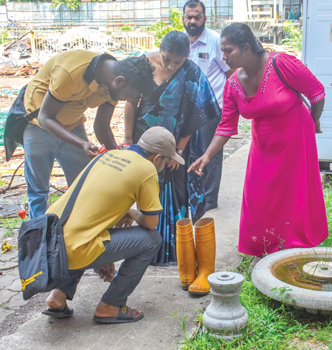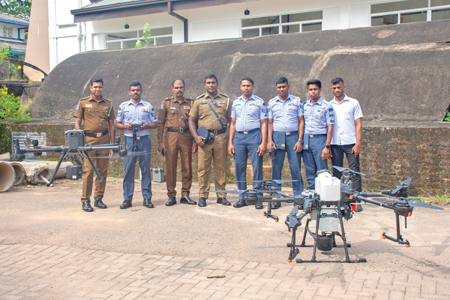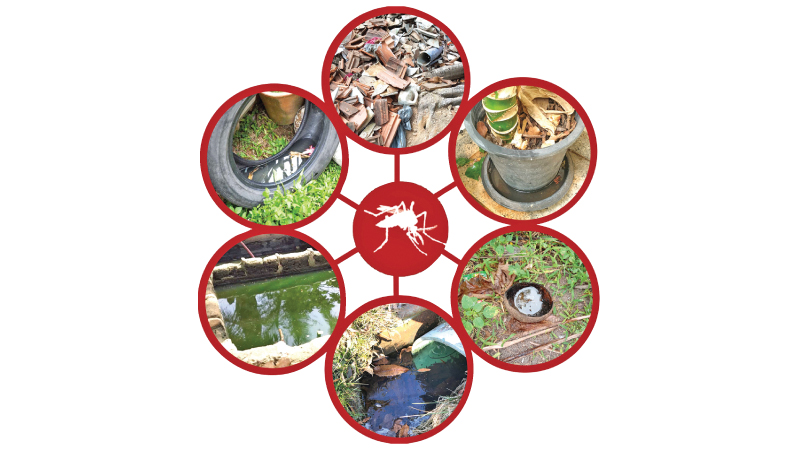 The recent scattered rains have been a relief from the unbearable heat, but they have also brought with them a much bigger threat of mosquito-borne diseases. Health authorities last week rang alarm bells that dengue and chikungunya have been causing double trouble, and that the situation has escalated to levels above the normal threshold for this period of the year. They warned of a rapid rise in cases with the monsoon rains.
The recent scattered rains have been a relief from the unbearable heat, but they have also brought with them a much bigger threat of mosquito-borne diseases. Health authorities last week rang alarm bells that dengue and chikungunya have been causing double trouble, and that the situation has escalated to levels above the normal threshold for this period of the year. They warned of a rapid rise in cases with the monsoon rains.
As usual, the Western Province, home to a dense population, has emerged as the hardest hit, prompting provincial authorities to launch a ‘War Against Dengue’, while the Health Ministry declared May a special month for mosquito eradication.
While Sri Lanka has been continuing the battle against dengue from the 1960s with epidemiological shifts over time, chikungunya has come, gone and come back again, with the first epidemic reported in the early 1960s. After four decades of quiescence, chikungunya re-emerged in November 2006, affecting an estimated 40,000 individuals between 2006 and 2007, according to the statistics of the Epidemiology Unit of the Health Ministry. Since late 2024, sporadic outbreaks of chikungunya have been confirmed in the Western Province and the Kandy district.
With both viruses being spread by the same mosquitoes, ‘Aedes aegypti’ and ‘Aedes albopictus’, there is a possibility for individuals to be infected with both viruses at the same time, and treatments for chikungunya could be life-threatening if mistakenly administered to a dengue patient, the health authorities plainly said last week.
In the face of this growing health challenge, health officials called on the citizenry to act swiftly and responsibly to destroy mosquito breeding grounds, be it in your own backyard, neighbourhood, workplace, school or any other public space, because every small effort counts.
Controlling the spread
There have been over 17,000 reported dengue cases so far this year, and nearly half of them were reported from the Western Province. The health authorities could confirm 65 cases of chikungunya as of the beginning of April, mostly from the Western Province. However, the exact number of chikungunya cases as of now remains a question, with potential unreported or misidentified cases.

Red notice issued for Krrish building after inspection
“Effective mosquito control is the mainstay of dengue and chikungunya prevention. The mosquitoes, which are spreading both diseases, breed in clean water. Keep your home and neighbourhood clean and free of receptacles which attract mosquitoes. We would not hesitate to take legal action if we find dengue mosquito breeding places during our inspections,” Western Provincial Health Services Director Dr. Dhammika Jayalath said.
The Western Provincial Council has even been using drone technology to conduct aerial surveillance for detecting mosquito breeding grounds. The officials also appealed to the public to properly dispose of domestic waste segregating it as biodegradable and non-biodegradable. “Do not throw garbage to abandon lands and canals,” they requested.
The people’s callous attitude towards waste disposal was abundantly exposed during the special exposition of the Sacred Tooth Relic of the Buddha (Siri Dalada Wandanawa) in Kandy last month. The discipline to keep the city clean cannot be enforced only through laws, but should come from within individuals, rather than prioritising convenience over responsibility.
The dengue mosquito can fly up to 400 metres looking for water collections to lay its eggs, but remains closer to human habitat, the Epidemiology Unit said. Therefore, keeping your home and surroundings clean will add protection to your family against these diseases.
Colombo Municipal Council (CMC) Chief Medical Officer of Health (MOH) Dr. Geethika Rathnawardana said that 70,000 houses had been inspected in the first quarter of the year, with 1,724 notices issued and legal action taken in 471 cases. The CMC receives complaints regarding abandoned lands and other places that could be breeding sites for mosquitoes via the telephone number 011 2 696594.
“During the quarter, 1,840 dengue cases were reported within the CMC’s jurisdiction, with a high number of cases from areas such as Wellawatte, Bambalapitiya, Kirulapone, Narahenpita, Borella and Cinnamon Gardens,” she added.
As children spend a significant amount of time at schools and preschools during the peak period of dengue and chikungunya transmission, clean-up drives have been intensified in them, said Western Province acting Education Director P. B. Devabandu. He said clear instructions and circulars have been issued to schools to prevent the spread of mosquito-borne diseases, while one-hour every Friday has been allocated for clean-up campaigns.
Shared symptoms

Using drones to detect mosquito breeding grounds
Both dengue and chikungunya have overlapping symptoms like high fever, severe headaches, muscle and joint pain, and rash. These vector-borne diseases can be detected through blood tests. Both have no specific cures, but treatments focus on managing symptoms and preventing complications, including rest and hydration.
While many dengue infections are asymptomatic or produce only mild illness, the virus can occasionally cause more severe cases and even death. Individuals infected for the second time are at greater risk of severe dengue. Some infected with the virus may develop Dengue Haemorrhagic Fever (DHF), a more severe form, characterised by high continuous fever, bleeding, severe continuous abdominal pain, and, in severe cases, shock. It can lead to death and is more serious in children and vulnerable groups.
The Chikungunya virus can cause long-term, debilitating joint pain in a significant portion of those infected, often for months or even years, a condition known as chronic chikungunya arthritis. Health authorities request people to seek medical advice if they have a fever for more than two days. Minimising mosquito exposure during the first week of illness helps prevent further spread of these viruses within the community.
Tips to get rid of mosquito breeding grounds
- Do not allow water to collect in tyres, flower vases, etc.
- Crush and bury empty tins, coconut shells during disposal.
- Add salt to the water in flower vases and traps. Change water frequently.
- Remove debris and leaves blocking drains and roof gutters.
- Mosquito-proof all utensils including water tanks.
- Regularly inspect rooftops of high-rise buildings and work sites.
- Bare lands must be properly cleaned.
- Avoid disposing of polythene bags and plastic containers into the open environment.
- Do not throw away garbage indiscriminately.
(Source: Epidemiology Unit)
****
Tips to protect your self from mosquito bites
- Since the mosquitoes that spread dengue are active during the day, personal protective measures should be applied, especially during the hours of highest mosquito activity (mid-morning and late afternoon).
- Wear protective clothes to cover the body.
- Use physical barriers such as screening doors and windows with mosquito-proof meshes.
- Use mosquito nets.
- Apply natural repellents such as citronella oil, lemongrass oil, neem oil and chemical repellents containing DEET (N, N-Diethyl-m-toluamide). Repellent use must follow the instructions on the product label.
(Source: Epidemiology Unit)







